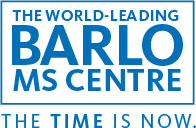Internationally regarded as a trailblazer in the field of MS, Dr. Xavier Montalban’s groundbreaking work has inspired new promise for the diagnosis and treatment of multiple sclerosis.
Recently recruited to St. Michael's from Barcelona, Spain’s renowned MS Centre of Catalonia, his arrival has been described as a “game-changer.”
St. Michael's Foundation spoke to Dr. Montalban about his refreshing perspective on patient care, boundless spirit of optimism and bold vision for the future.
Neurology is an incredibly complex field – what inspired you to pursue it?
“I wanted to be a biologist, but my brother convinced me to become a doctor. I considered other fields, but neurology (the branch of medicine that deals with the anatomy and disorders of nerves and the nervous system) seemed especially challenging. It is very complex, but at the same time, very logical. If you understand how the nervous system functions, you realize that everything has an explanation – that’s why I decided to specialize in this field. It isn’t for everyone, though. You must be patient, optimistic and able to see past obstacles.”
You established the renowned MS Centre of Catalonia (cemcat), and became internationally regarded as one of the most important MS thought leaders in the world. How did it come to life?
“When I first started out in Spain, we had no treatment for MS. It was deeply concerning. So I began developing research and clinical care programs dedicated to improving the quality of life of those living with MS. Then, in 1995, the first drug appeared, and all our efforts went into bringing the MS Centre of Catalonia to life. Luckily, donors supported us and we ended up with a standalone building of 20,000 sq. ft. fully dedicated to the disease. Our unique multidisciplinary approach meant patients could be diagnosed and treated at the same place, undergo rehab and partake in research if they wished. It was a long journey, but at the same time very short and very rewarding.”
You had your choice of moving to any country, to work at any hospital – why Canada, and why St. Michael's?
“Canada has the highest incidence of MS in the world, and Toronto has 7,000 or more patients living with the disease. At the same time, St. Michael's has a longstanding reputation as a major teaching and research hospital. In my mind, there is no better place to be than right here in the heart of Canada’s largest city.”
Tell us about your bold vision for St. Michael's Hospital.
“We have an opportunity, which I can only describe as a dream. This is not going to happen twice. To have the right country, the right city, the right hospital, with 7,000 MS patients to serve and generous donors by our side – I am very aware that this will not happen again. Joining St. Michael's is a great responsibility, but it is also a great opportunity.”
How excited are you about the possibilities of MS research and treatment based on the advancements you’ve seen in the past 25 years?
“MS is the only neurological disorder in which we’ve been able to greatly modify its natural history. When I started in 1990, there was nothing there. By 1995, we had the first drug – and today we have about 14 drugs available. There are two components of the disease – inflammation and degeneration. We can now control the inflammatory phenomenon almost completely, and that means that the neurodegenerative component is slower and much less pronounced than it was in the past. So the prognosis has improved quite a lot. The natural history we know today has nothing to do with the one we knew 15 years ago, which is very exciting.”
St. Michael's Foundation is committed to raising funds to support critical MS initiatives. What’s your message to readers who are considering making a gift?
“People in Canada and Toronto should take into account that MS is the leading cause of disability in the country, by far, and it could impact any family. Ask anyone if they know someone who has MS, and I am confident they will say they do. If you are able to collaborate in any way, you will be making a difference in the lives of many people.”
Are you excited about the future of MS treatment and care?
“If we make the diagnosis early and start treatment early, we can prevent the onset of disability. If the patient has no relapses and no progression, then we are successful. I am excited about how far we’ve come and where we can go.”
